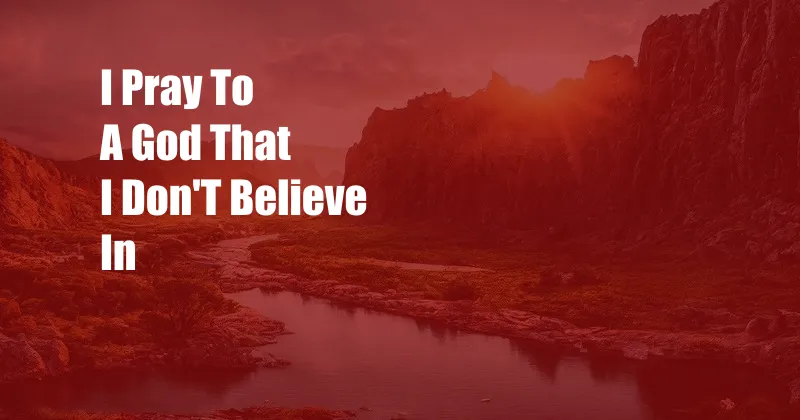
I Pray to a God that I Don’t Believe In
In the quietude of the night, when shadows dance and the world slumbers, I find myself drawn to a ritual that seems both familiar and foreign. With trembling hands, I fold my palms together, close my eyes, and whisper words that have been etched into my memory since childhood. I pray to a God that I don’t believe in.
It’s a strange paradox, a dichotomy that I’ve struggled to reconcile for years. On the one hand, my intellect rejects the existence of a supernatural deity, a being that resides outside the realm of scientific understanding. On the other hand, there’s a part of me that yearns for something greater than myself, something to guide me through the complexities of life.
The Search for Meaning in a Godless Universe
In the absence of a traditional faith, I’ve embarked on a solitary exploration of the human experience. I’ve delved into philosophy, seeking wisdom in the words of ancient thinkers. I’ve studied psychology, trying to understand the intricate workings of the mind. And I’ve immersed myself in the beauty of art and music, hoping to find solace in their transformative power.
Through these experiences, I’ve come to embrace a profound sense of awe and wonder for the natural world. I marvel at the intricate design of the human body, the vastness of the cosmos, and the resilience of life itself. It’s in these moments of contemplation that I feel closest to something divine, something that transcends the limitations of my mortal existence.
A Personal Definition of God
So, if I don’t believe in a traditional God, what do I pray to? I believe in the power of the human spirit, in the capacity for love, compassion, and empathy. I pray to the universe, to the collective wisdom of all those who have come before us. I pray to the future, to the hopes and dreams that inspire us to strive for a better world.
My prayers are not pleas for divine intervention or for material gain. They are reflections on gratitude, affirmations of hope, and expressions of vulnerability. They are a way of connecting with something larger than myself, of finding meaning in a vast and often overwhelming world.
The Benefits of Prayer Without Belief
While I don’t claim to have all the answers, I’ve found that prayer, even without belief in a traditional God, offers numerous benefits. It provides a sense of peace and comfort in times of distress. It helps me to focus on the present moment and to let go of worries about the past or the future.
Prayer can also inspire me to act in ways that align with my values. By reflecting on my intentions and by seeking guidance from a higher source, I’m more likely to make decisions that are in harmony with my purpose.
Expert Advice and Tips for Meaningful Prayer
If you’re considering exploring prayer without belief, here are a few tips:
- Start small: Don’t try to force yourself into a rigid prayer routine. Find a few minutes each day to sit quietly and contemplate. Even a few moments of reflection can make a difference.
- Be honest with yourself: Don’t pray for things you don’t truly desire or believe in. Instead, focus on what’s important to you and on what you hope to achieve.
- Experiment with different forms of prayer: There’s no one right way to pray. Experiment with different approaches, such as meditation, journaling, or simply spending time in nature.
- Don’t be afraid to ask for help: If you’re struggling to find meaning in your prayers, talk to a trusted friend, counselor, or spiritual guide.
Frequently Asked Questions
- Why pray if you don’t believe in God?
- What do you pray to?
- Is it okay to pray without believing?
- Can prayer help me in practical ways?
Prayer can provide a sense of peace, comfort, and guidance even in the absence of belief in a traditional deity.
You can pray to the universe, to the collective wisdom of humanity, to your own inner wisdom, or to a higher source of your own understanding.
Absolutely. Prayer is not limited to those who believe in a specific religion or dogma.
Prayer can provide emotional support, help you to focus on your goals, and inspire you to act in ways that align with your values.
Conclusion
Prayer without belief is a deeply personal and transformative experience. It’s a way of connecting with something greater than ourselves, of finding meaning in a vast and often overwhelming world. Whether you choose to pray to a specific deity, to the universe, or to your own inner wisdom, the act of prayer can offer solace, inspiration, and a sense of purpose.
Are you interested in exploring the topic of prayer without belief further? What are your thoughts and experiences on this subject?